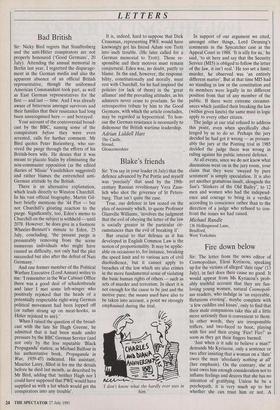LETTERS Bad British
Sir: Nicky Bird regrets that Stauffenberg and the anti-Hitler conspirators are not properly honoured (`Good Germans', 20 July). Attending the annual memorial in Berlin last year, I regretted the disparage- ment in the German media and also the apparent absence of an official British representative, though the uniformed American Commandant took part, as well as East German representatives for the first — and last — time. And I was already aware of bitterness amongst survivors and their families that their resistance had long been unrecognised here — and betrayed.
Your account of the controversial broad- cast by the BBC, naming some of the conspirators before they were even arrested, calls for further comment. Mr Bird quotes Peter Bielenberg, who sur- vived the purge through the efforts of his British-born wife. He denies that it was meant to placate Stalin by eliminating the non-communist opposition (as the edited diaries of `Missie' Vassilchikov suggested) and rather blames the entrenched anti- German attitude by the British.
There is an alternative explanation, which leads directly to Winston Churchill. In his vast official biography, Martin Gil- bert briefly mentions the '44 Plot — but not Churchill's gloating reaction to the purge. Significantly, too, Eden's memo to Churchill on the subject is withheld — until 2078. However, he does give in a footnote Wheeler-Bennett's minute to Eden, 25 July, concluding, `the present purge is presumably removing from the scene numerous individuals who might have caused us difficulty, not only had the plot succeeded but also after the defeat of Nazi Germany.'
And one former member of the Political Warfare Executive (Lord Annan) writes to me: 'I remember in the War Cabinet Office there was a good deal of schadenfreude and later I met some left-winger who positively rejoiced that the heads of a potentially respectable right-wing German political movement had been lopped off (or rather strung up on meat-hooks, as Hitler rejoiced to see).'
When I raised the question of the broad- cast with the late Sir Hugh Greene, he admitted that it had been made under pressure by the BBC German Service (and not only by the less reputable `Black Propaganda' station, as Michael Balfour in his authoritative book, Propaganda in War, 1939-45) indicated. His assistant, Maurice Latey, filled in for me the details before he died last month, as described by Mr Bird, adding that 'neither Hugh nor I could have supposed that PWE would have supplied us with a list which would get the conspirators into any trouble'. It is, indeed, hard to suppose that Dick Crossman, representing PWE would have knowingly got his friend Adam von Trott into such trouble. (He later called for a German memorial to Trott). Those re- sponsible and their motives must remain conjectural. Eden was, no doubt, partly to blame. In the end, however, the responsi- bility, constitutionally and morally, must rest with Churchill, for he had inspired the policies (or lack of them) in the 'great alliance' and the prevailing attitudes, as his admirers never cease to proclaim. So the retrospective tribute by him to the Good Germans, with which the article concludes, may be regarded as hypocritical. To hon- our the German resistance is necessarily to dishonour the British wartime leadership.
Adrian Liddell Hart
The Castle, Stroud, Gloucestershire


















































 Previous page
Previous page